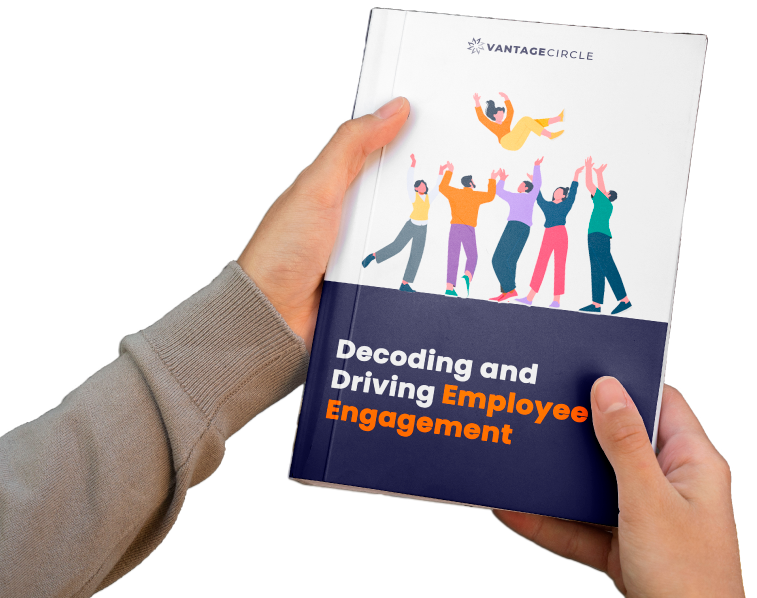Soft Skills in the Workplace: Nurturing a Distinct Advantage
89% of new hire failures were due to poor soft skills, not technical shortcomings.
Apart from hard skills, demonstrating soft skills in the workplace has become equally beneficial for employees today, regardless of their career stage. Soft skills like interpersonal, human, and people skills allow employees to navigate social workplace dynamics effectively - which is why they are very critical.
This blog aims to explore the concept of soft skills and their relevance in the workplace.
It will clarify the meaning of soft skills and their significance within professional settings.
Additionally, it will provide a brief overview of 17 crucial soft skills that HR professionals should cultivate and guide employees in developing.
What are Soft Skills?
Soft skills encompass abilities linked to communication, personality traits, social awareness, and behavioral habits. They reflect how individuals interact and collaborate with others.
While hard skills like learning HTML code are acquired, soft skills are more intrinsic. Like emotions or a sharp perception, soft skills are inherent qualities individuals possess. Refining these skills enhances a person's ability to understand people better. Hard skills are crucial for job proficiency.
However, strong, soft skills bring positive qualities to the work environment. That contributes to effective interpersonal dynamics.
Soft Skills in the Workplace
In the workplace, soft skills encompass qualities that contribute to:
- successful collaboration,
- communication, and
- task management.
These skills include effective communication, problem-solving, time management, leadership, adaptability, and more.
Only 37% of employers believe their entry-level employees possess the essential soft skills.
Why are Soft Skills Important in the Workplace?
Soft skills matter significantly in the workplace because they are the glue that holds a team together.
Imagine a sports team – each player needs technical skills and the ability to communicate and coordinate on the field.
Similarly, in a workplace, you might be a brilliant data analyst. But, if you can't explain your findings to your team, the full potential of your skills may not be realized. Imagine having a graphic designer on your team who creates stunning visuals (hard skills).
But at the same time, wouldn’t you require them:
- To collaborate with clients seamlessly?
- To easily understand their needs?
- To simplify complex ideas?
- To make communication smooth?
That means it's the soft skills that truly shine.
These interpersonal skills elevate them beyond a skilled professional. In the long run, it makes them valuable assets for the entire creative process.
Thus, soft skills in the workplace are the secret sauce. That secret sauce transforms individual talents into collaborative success stories.
Ninety-three percent of employers say soft skills play a critical role in their decision about whom they want to hire. — Ian Siegel, co-founder and CEO of ZipRecruiter, in a 2022 job outlook report.
In the following section, we look at:
- 17 soft skills in the workplace,
- highlight their importance and
- outline strategies for HR leaders to develop these skills in their workforce.
17 Soft Skills in the Workplace HRs Mustn’t Ignore
1. Communication skills
This encompasses the ability to articulate thoughts and actively listen to others. Good communication is crucial for collaboration and understanding in the workplace. HR can enhance this by:
- organizing workshops focused on effective speaking and listening skills,
- promoting a feedback culture and
- introducing communication tools that facilitate open and consistent dialogue.
Related article: Looking Ahead: The Future of Business Communication Tools in 2024
2. Teamwork and Collaboration
Teamwork involves working cohesively with others to achieve common goals. Effective teamwork leads to improved productivity and morale. HR can foster this by:
- arranging team-building activities,
- encouraging collaborative projects and
- recognizing team achievements to reinforce the value of collective effort.
3. Problem-solving and Critical Thinking
This involves analyzing issues, thinking creatively, and making logical decisions. It's vital for innovation and dealing with workplace challenges. HR can support this by:
- providing problem-solving workshops,
- encouraging a culture that doesn't shy away from challenges and
- allowing employees to tackle real-life problems in safe, simulated environments.
4. Leadership
Leadership skills are not just for managers. They are crucial at all levels for guiding teams and inspiring others.
HR can nurture leadership qualities by:
- offering development programs,
- setting up mentorship opportunities and
- identifying and nurturing potential leaders.
5. Adaptability and Flexibility
In the fast-changing workplace, adaptability and flexibility are key to success. HR can promote this by:
- providing training on managing change,
- exposing employees to different types of work and
- encouraging an open-minded approach to new ideas and methods.
Read our blog on: Flexibility In The Workplace - What Employees Look Forward To In 2024
6. Time Management and Organizational Skills
Efficient time management and organization are critical for productivity. HR can aid this by:
- offering workshops on time management,
- introducing organizational tools,
- and promoting strategies for effective prioritization.
7. Emotional Intelligence
Emotional intelligence in the workplace includes understanding and managing one's emotions and those of others. It leads to better teamwork and leadership. HR can develop this by:
- offering training on emotional awareness,
- stress management and
- fostering an empathetic work environment.
8. Professionalism
This refers to conducting oneself with responsibility, integrity, accountability, and excellence. It's important for maintaining a positive workplace culture. HR can emphasize professionalism through:
- orientation programs,
- creating a code of conduct and
- setting clear expectations around workplace behavior.
9. Digital Literacy
Proficiency in digital tools and technologies is increasingly important in today’s workplace. HR can promote digital literacy by:
- providing regular technology training,
- updating staff on new tools and
- encouraging digital collaboration.
10. Negotiation and Persuasion
These skills are essential for achieving mutually beneficial outcomes. HR can enhance these by:
- organizing negotiation skills workshops,
- providing real-world negotiation scenarios for practice and
- teaching persuasive communication techniques.
11. Resilience
Recovering from setbacks is crucial for long-term success. HR can support resilience by:
- offering training focusing on coping strategies,
- creating a supportive work environment and
- recognizing employees who show resilience.
12. Attention to Detail
This skill ensures the accuracy and quality of work. HR can foster this by:
- incorporating detail-oriented practices in training,
- providing feedback on work and
- celebrating when employees show exceptional attention to detail.
13. Networking and Customer Service Orientation
Networking involves building professional relationships. Again, customer service orientation is about understanding and meeting client needs. HR can develop these skills by:
- organizing networking events,
- offering customer service training and
- encouraging relationship-building activities.
14. Creativity
Creativity is about thinking out of the box and innovating. HR can encourage this by:
- setting up brainstorming sessions,
- supporting cross-functional collaborations and
- recognizing creative contributions.
Read our blog on: 10 Moves To Unleash Creativity At Work For Better Output
15. Conflict Management
This involves addressing and resolving workplace disputes decisively. HR can aid in developing these skills by:
- offering conflict management training,
- providing mediation services and
- establishing clear protocols for conflict resolution.
A must read: A Quick Guide To Conflict Resolution In The Workplace
16. Presentation and Advisory Skills
Effective presentation and advisory skills are key for sharing information and expertise. HR can enhance these skills through:
- public speaking workshops,
- mentorship programs, and
- opportunities for employees to present their work and provide advice.
17. Recognizing Skills
Recognizing skills involves identifying and appreciating team members' diverse abilities and strengths. Recognizing the unique skills of individuals contributes to more effective team dynamics and enhances employee morale.
HR can develop this skill by training managers and team leaders in talent recognition techniques.
This includes:
- conducting workshops on identifying and leveraging individual strengths within teams,
- implementing regular employee skills assessments and
- empowering your workforce with a peer-to-peer recognition.
By doing so, HR can ensure that each employee’s unique capabilities are acknowledged and utilized effectively. It is sure to contribute to a more dynamic and productive workplace environment.
Your team members can now easily recognize their colleagues through various badges, spot awards, monetary incentives, and more — all with a simple click. Explore further by clicking here.
Conclusion
LinkedIn's 2019 Global Talent Trends report indicated that:
92% of talent professionals and hiring managers view soft skills as equally or more important than hard skills.
Additionally, a study by the Society for Human Resource Management found that:
Employers care more about soft skills such as integrity, reliability, and teamwork than technical abilities.
However, measuring soft skills in the workplace can be challenging due to their subjective nature.
But some effective methods include:
- 360-degree feedback,
- performance reviews focusing on soft skill competencies and
- behavior observation in various work scenarios.
Overall, continuous learning and development are key to perfecting these skills. This can be facilitated through workshops, mentorship programs, and regular feedback sessions. Encouraging a culture of open communication and reflection also helps employees continually assess and improve their soft skills.


















